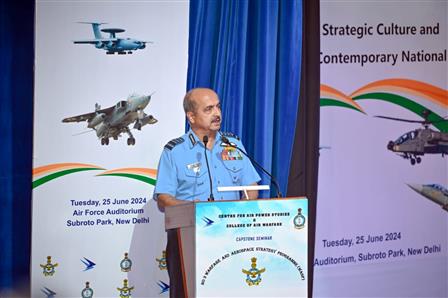IAF Concludes WASP Seminar
FIRST WASP WITH TRI-SERVICE PARTICIPATION
"Modern warfare demands that military leaders must not only be adept at combat, but must also possess strategic thinking ability and grasp of the evolving geo-political landscape."- CAS
Indian Air Force today conducted a capstone seminar marking the culmination of the No. 3 Warfare & Aerospace Strategy Program (WASP) at the Air Force Auditorium, New Delhi. The seminar with the theme "India's Strategic Culture and Imperative for Contemporary National Security' was conducted under the aegis of the College of Air Warfare and Centre for Air Power Studies.
WASP is a strategic education programme of 15 weeks duration which was started in 2022 to provide the participants with a deep understanding of geo-politics, grand strategy and Comprehensive National Power. The broader aim is to nurture critical thinkers who can blend cross-domain knowledge to generate policy-driving ideas at the strategic level.
This edition of WASP saw tri-services participation for the first time. The participants comprised fourteen officers from Indian Air Force, two officers from the Indian Navy, one officer from the Indian Army and a research scholar. The participants underwent intensive training in the fields of Strategy, Military History, Civil-Military relations, Higher Defence Organisation, Aerospace Power, Information Warfare, Technology and Hybrid Warfare. The program was guided by an external faculty consisting of accomplished practitioner-scholars with extensive teaching and research experience. The graduates of the program were awarded a PG diploma in Strategic Studies by Rashtriya Raksha University.
Air Chief Marshal VR Chaudhari, Chief of the Air Staff (CAS), delivered the keynote address of the seminar which was attended by Gen Anil Chauhan, Chief of the Defence Staff, Gen Manoj Pande, Chief of the Army Staff, senior officers from all three services, aerospace power scholars, academia and established defence correspondents. He highlighted that the dynamic environment of modern warfare demanded that military leaders not only be adept at combat, but also possess strategic thinking ability and grasp of the evolving geo-political landscape. The CAS congratulated the course participants for successfully completing the rigorous program. While concluding, the CAS complimented the mentors who guided the participants through the programme and urged them to continue with the same zeal in the forthcoming editions of the WASP.
In the first session of the Seminar, the participants presented their papers on the topics of 'Examining International Relations through India's Strategic Culture' and 'Military Outlook through Strategic Partnerships'. This was followed by the second session, which saw them discussing 'Evolution of Civil-Military Relations in India' and 'Imperatives of Evolving Security Environment on Future Contours of Civil-Military Fusion (CMF).


